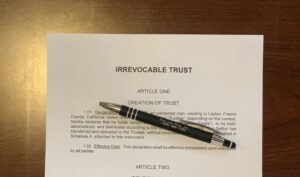
Generally, an irrevocable trust, by its terms, is one that cannot be modified. However, the Probate Code identifies limited circumstances in which modification is allowed,
which includes (1) when all the beneficiaries consent (Prob. Code § 15403(b); (2) with the written consent of the settlor and all beneficiaries (Prob. Code § 15404(a); (3) by the settlor and fewer than all the beneficiaries, if the interests of the nonconsenting beneficiaries are not substantially impaired (Prob. Code §15404(b); (4) when the trust has an uneconomically low principal (Prob. Code §15408); or (5) when there are changed circumstances where the circumstances were neither known nor anticipated by the settlor and continuation of the trust under its terms would defeat or substantially impair the purpose of the trust (Prob. Code § 15409). It is important to note that court approval is required in each instance except when there is written consent by the settlor and all the beneficiaries.
On September 14, 2018, California enacted the Uniform Trust Decanting Act (Prob. Code §§ 19501
et seq.), which became effective on January 1, 2019. An irrevocable trust created on or after January 1, 2019, may be decanted if the trust has its principal place of administration in California or provides by language within the trust instrument that it is governed by California law or governed by California law for purposes of administration. Prob. Code § 19505. The Act allows a trustee to modify the terms of the trust, with some limitations, without the consent of the beneficiaries or approval by the court by “decanting” – or pouring – the assets of the first trust into a second trust with modified terms. The terms of the trust that can be modified depend upon whether the trustee has “limited distributive discretion” or “expanded distribution discretion”. A trustee with limited distributive discretion can exercise the decanting power to modify only administrative provisions, whereas a trustee with expanded distributive discretion can modify both administrative and dispositive provisions of the trust. In either case, under the Act, a trustee may not make a modification that includes a person as a current beneficiary in the second trust who was not a current beneficiary of the first trust, include a person as a presumptive remainder beneficiary or successor beneficiary in the second trust who was not such a beneficiary in the first trust, or reduce or eliminate a vested interest of a beneficiary. Prob. Code § 19511(c).
A significant aspect of the Act is that a trustee may exercise the decanting power without the consent of any person and without approval of the court; however, this requires that the trustee provide notice at least sixty (60) days before the exercise of the decanting power to specified persons. Prob. Code §19507. Certain notice requirements are specified under the Act, which includes, but is not limited to, including a statement of the reason for the proposed decanting and an explanation as to the differences between the first and second trusts, and providing a copy of the first and second trust instruments.
Ibid. While the Act affords a trustee the ability to modify an irrevocable trust, it may not be appropriate in all circumstances.
If you have any questions regarding modification of a trust, please contact Dias Law Firm, Inc.
By: Ella R. Floresca
 For the general public
For the general public: This Blog/Web Site is made available by the law firm publisher, Dias Law Firm, Inc., for educational purposes. It provides general information and a general understanding of the law, but does not provide specific legal advice. By using this site, commenting on posts, or sending inquiries through the site or contact email, you confirm that there is no attorney-client relationship between you and the Blog/Web Site publisher. The Blog/Web Site should not be used as a substitute for competent legal advice from a licensed attorney in your jurisdiction.
For attorneys: This Blog/Web Site is informational in nature and is not a substitute for legal research or a consultation on specific matters pertaining to your clients. Due to the dynamic nature of legal doctrines, what might be accurate one day may be inaccurate the next. As such, the contents of this blog must not be relied upon as a basis for arguments to a court or for your advice to clients without, again, further research or a consultation with our professionals.

 Generally, an irrevocable trust, by its terms, is one that cannot be modified. However, the Probate Code identifies limited circumstances in which modification is allowed,
which includes (1) when all the beneficiaries consent (Prob. Code § 15403(b); (2) with the written consent of the settlor and all beneficiaries (Prob. Code § 15404(a); (3) by the settlor and fewer than all the beneficiaries, if the interests of the nonconsenting beneficiaries are not substantially impaired (Prob. Code §15404(b); (4) when the trust has an uneconomically low principal (Prob. Code §15408); or (5) when there are changed circumstances where the circumstances were neither known nor anticipated by the settlor and continuation of the trust under its terms would defeat or substantially impair the purpose of the trust (Prob. Code § 15409). It is important to note that court approval is required in each instance except when there is written consent by the settlor and all the beneficiaries.
On September 14, 2018, California enacted the Uniform Trust Decanting Act (Prob. Code §§ 19501 et seq.), which became effective on January 1, 2019. An irrevocable trust created on or after January 1, 2019, may be decanted if the trust has its principal place of administration in California or provides by language within the trust instrument that it is governed by California law or governed by California law for purposes of administration. Prob. Code § 19505. The Act allows a trustee to modify the terms of the trust, with some limitations, without the consent of the beneficiaries or approval by the court by “decanting” – or pouring – the assets of the first trust into a second trust with modified terms. The terms of the trust that can be modified depend upon whether the trustee has “limited distributive discretion” or “expanded distribution discretion”. A trustee with limited distributive discretion can exercise the decanting power to modify only administrative provisions, whereas a trustee with expanded distributive discretion can modify both administrative and dispositive provisions of the trust. In either case, under the Act, a trustee may not make a modification that includes a person as a current beneficiary in the second trust who was not a current beneficiary of the first trust, include a person as a presumptive remainder beneficiary or successor beneficiary in the second trust who was not such a beneficiary in the first trust, or reduce or eliminate a vested interest of a beneficiary. Prob. Code § 19511(c).
A significant aspect of the Act is that a trustee may exercise the decanting power without the consent of any person and without approval of the court; however, this requires that the trustee provide notice at least sixty (60) days before the exercise of the decanting power to specified persons. Prob. Code §19507. Certain notice requirements are specified under the Act, which includes, but is not limited to, including a statement of the reason for the proposed decanting and an explanation as to the differences between the first and second trusts, and providing a copy of the first and second trust instruments. Ibid. While the Act affords a trustee the ability to modify an irrevocable trust, it may not be appropriate in all circumstances.
If you have any questions regarding modification of a trust, please contact Dias Law Firm, Inc.
By: Ella R. Floresca
Generally, an irrevocable trust, by its terms, is one that cannot be modified. However, the Probate Code identifies limited circumstances in which modification is allowed,
which includes (1) when all the beneficiaries consent (Prob. Code § 15403(b); (2) with the written consent of the settlor and all beneficiaries (Prob. Code § 15404(a); (3) by the settlor and fewer than all the beneficiaries, if the interests of the nonconsenting beneficiaries are not substantially impaired (Prob. Code §15404(b); (4) when the trust has an uneconomically low principal (Prob. Code §15408); or (5) when there are changed circumstances where the circumstances were neither known nor anticipated by the settlor and continuation of the trust under its terms would defeat or substantially impair the purpose of the trust (Prob. Code § 15409). It is important to note that court approval is required in each instance except when there is written consent by the settlor and all the beneficiaries.
On September 14, 2018, California enacted the Uniform Trust Decanting Act (Prob. Code §§ 19501 et seq.), which became effective on January 1, 2019. An irrevocable trust created on or after January 1, 2019, may be decanted if the trust has its principal place of administration in California or provides by language within the trust instrument that it is governed by California law or governed by California law for purposes of administration. Prob. Code § 19505. The Act allows a trustee to modify the terms of the trust, with some limitations, without the consent of the beneficiaries or approval by the court by “decanting” – or pouring – the assets of the first trust into a second trust with modified terms. The terms of the trust that can be modified depend upon whether the trustee has “limited distributive discretion” or “expanded distribution discretion”. A trustee with limited distributive discretion can exercise the decanting power to modify only administrative provisions, whereas a trustee with expanded distributive discretion can modify both administrative and dispositive provisions of the trust. In either case, under the Act, a trustee may not make a modification that includes a person as a current beneficiary in the second trust who was not a current beneficiary of the first trust, include a person as a presumptive remainder beneficiary or successor beneficiary in the second trust who was not such a beneficiary in the first trust, or reduce or eliminate a vested interest of a beneficiary. Prob. Code § 19511(c).
A significant aspect of the Act is that a trustee may exercise the decanting power without the consent of any person and without approval of the court; however, this requires that the trustee provide notice at least sixty (60) days before the exercise of the decanting power to specified persons. Prob. Code §19507. Certain notice requirements are specified under the Act, which includes, but is not limited to, including a statement of the reason for the proposed decanting and an explanation as to the differences between the first and second trusts, and providing a copy of the first and second trust instruments. Ibid. While the Act affords a trustee the ability to modify an irrevocable trust, it may not be appropriate in all circumstances.
If you have any questions regarding modification of a trust, please contact Dias Law Firm, Inc.
By: Ella R. Floresca
 For the general public: This Blog/Web Site is made available by the law firm publisher, Dias Law Firm, Inc., for educational purposes. It provides general information and a general understanding of the law, but does not provide specific legal advice. By using this site, commenting on posts, or sending inquiries through the site or contact email, you confirm that there is no attorney-client relationship between you and the Blog/Web Site publisher. The Blog/Web Site should not be used as a substitute for competent legal advice from a licensed attorney in your jurisdiction.
For attorneys: This Blog/Web Site is informational in nature and is not a substitute for legal research or a consultation on specific matters pertaining to your clients. Due to the dynamic nature of legal doctrines, what might be accurate one day may be inaccurate the next. As such, the contents of this blog must not be relied upon as a basis for arguments to a court or for your advice to clients without, again, further research or a consultation with our professionals.
For the general public: This Blog/Web Site is made available by the law firm publisher, Dias Law Firm, Inc., for educational purposes. It provides general information and a general understanding of the law, but does not provide specific legal advice. By using this site, commenting on posts, or sending inquiries through the site or contact email, you confirm that there is no attorney-client relationship between you and the Blog/Web Site publisher. The Blog/Web Site should not be used as a substitute for competent legal advice from a licensed attorney in your jurisdiction.
For attorneys: This Blog/Web Site is informational in nature and is not a substitute for legal research or a consultation on specific matters pertaining to your clients. Due to the dynamic nature of legal doctrines, what might be accurate one day may be inaccurate the next. As such, the contents of this blog must not be relied upon as a basis for arguments to a court or for your advice to clients without, again, further research or a consultation with our professionals.

